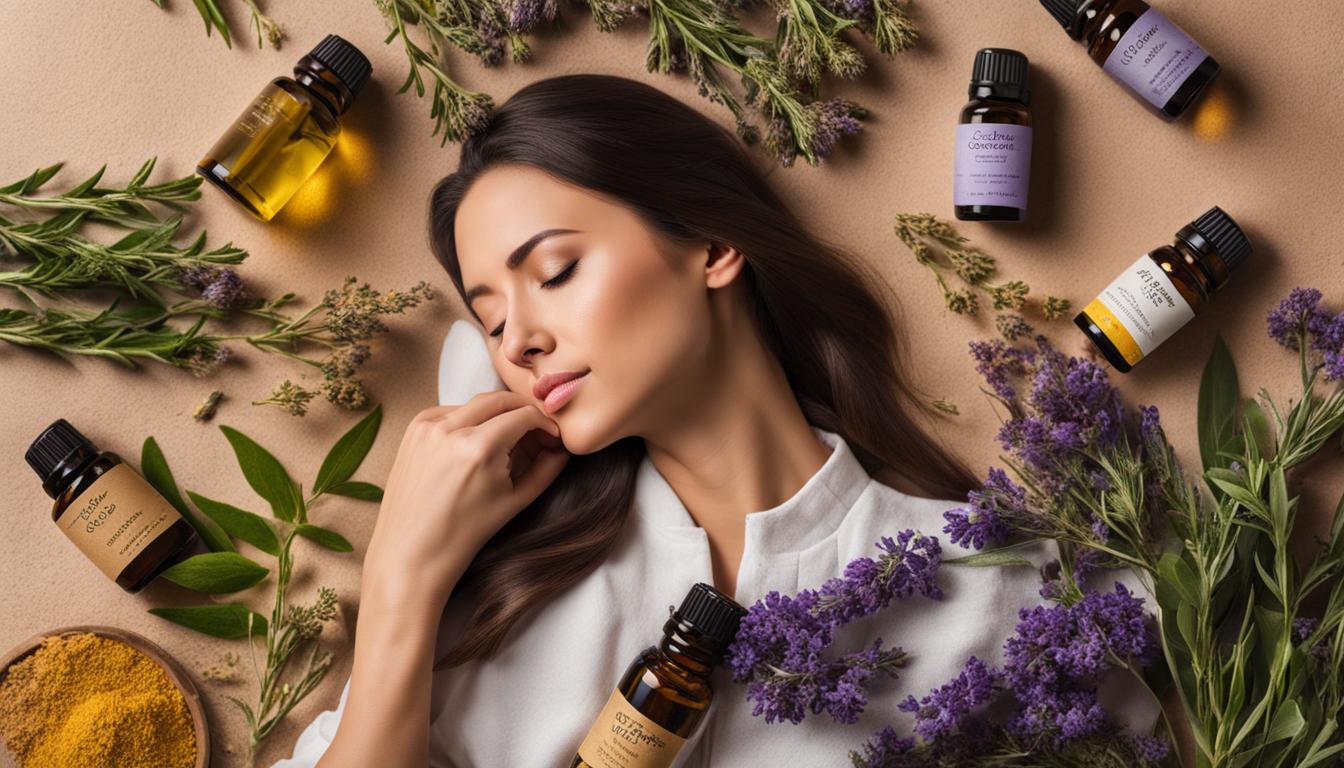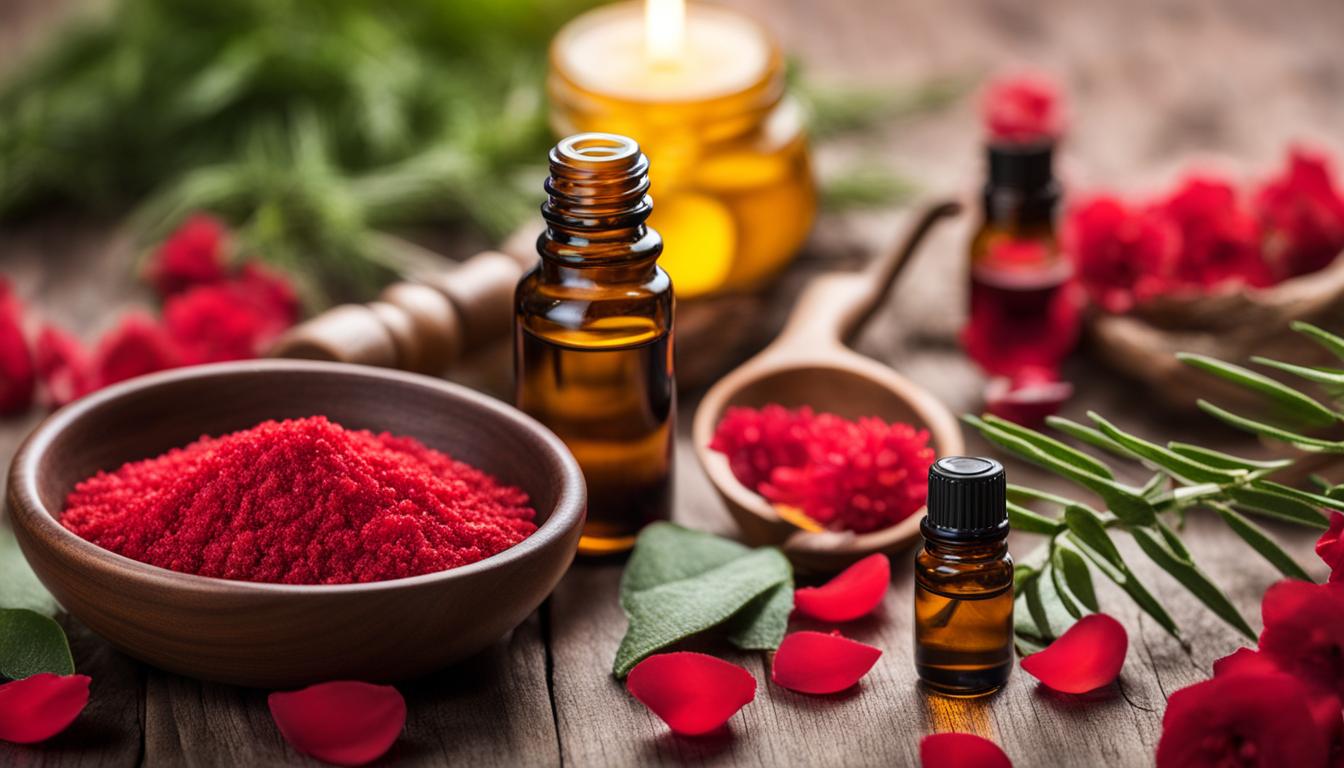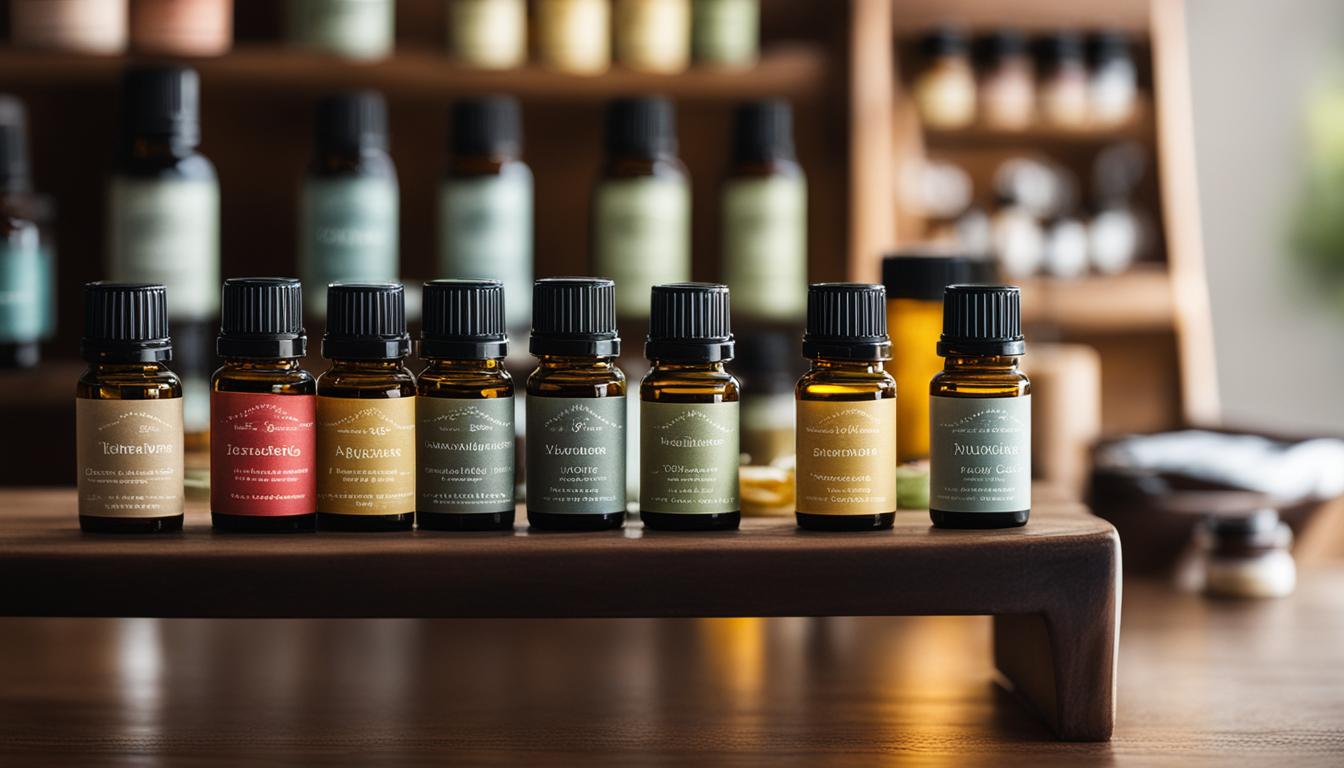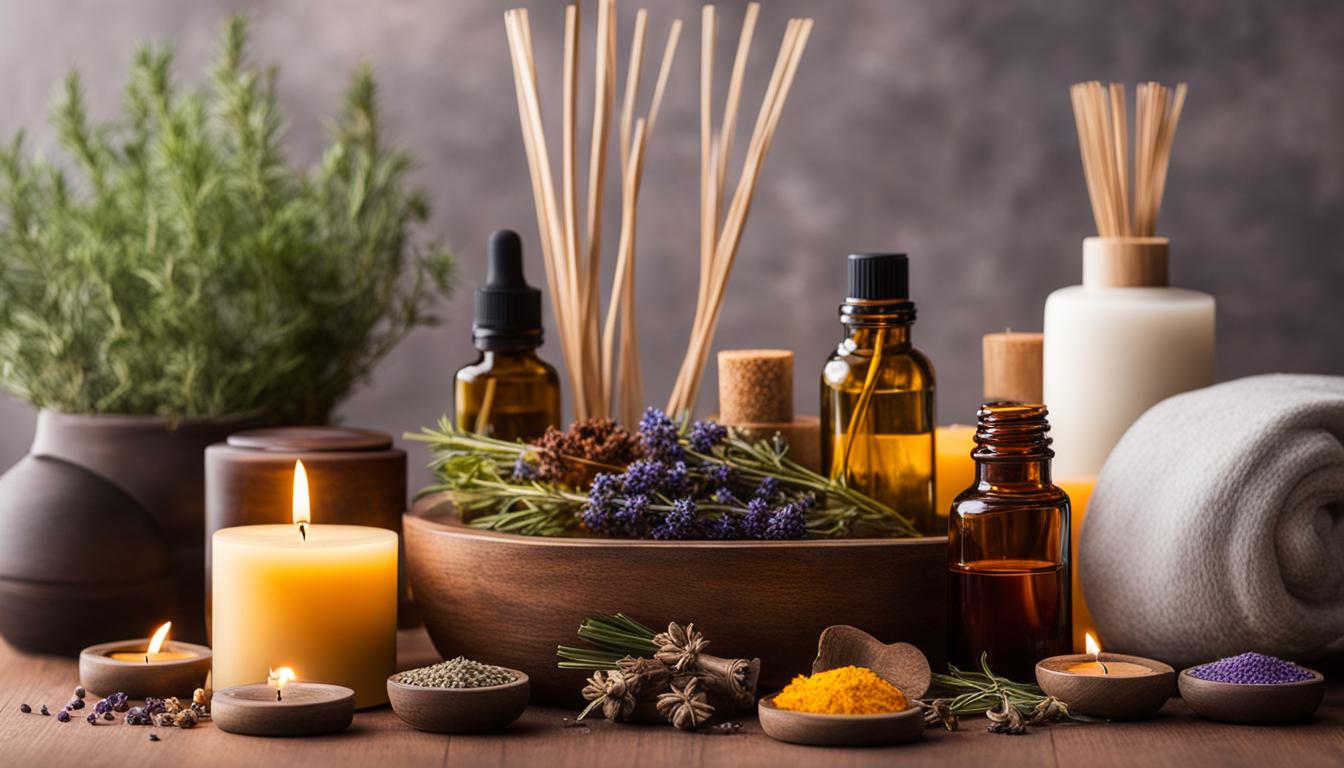Essential oils, derived from plants, have long been used for various therapeutic purposes. Aromatherapy, the practice of using these oils, harnesses the power of scents to promote health and well-being. While scientific research on the effectiveness of aromatherapy is ongoing, many people have experienced benefits such as stress relief, relaxation, improved sleep, pain management, immune system support, mental clarity, and emotional well-being.
Key Takeaways:
- Aromatherapy uses essential oils to promote health and well-being.
- Benefits may include stress relief, relaxation, improved sleep, pain management, immune system support, mental clarity, and emotional well-being.
- Scientific research on the effectiveness of aromatherapy is ongoing.
- Choose high-quality essential oils and use them safely and responsibly.
- Consult a healthcare professional for personalized advice.
What Are Essential Oils and Aromatherapy?
Essential oils are concentrated plant extracts obtained through steaming or pressing various parts of a plant. These natural oils contain the aromatic compounds and therapeutic properties of the plants they are derived from. With their potent fragrance and therapeutic benefits, essential oils have been used for centuries in the practice of aromatherapy.
Aromatherapy is the art and science of using essential oils to enhance physical and emotional well-being. It involves inhaling the scents of essential oils or applying them topically to absorb their therapeutic benefits through the skin. When inhaled, the aromatic molecules of essential oils stimulate the olfactory system and directly affect the brain’s emotional center, influencing mood, stress levels, and overall well-being.
Essential oils have been studied extensively for their potential therapeutic benefits in managing various health conditions such as stress, pain, and sleep disorders. They are known to possess anti-inflammatory, antimicrobial, and analgesic properties, among others, making them valuable for natural health support.
Aromatherapy offers a holistic approach to wellness by harnessing the power of essential oils. Whether inhaled or absorbed, these plant extracts have the potential to provide therapeutic benefits that can positively impact your physical and emotional health, promoting relaxation, alleviating stress, and supporting overall well-being.
“Essential oils are nature’s gift to us, providing us with a natural and aromatic way to improve our well-being and enhance our quality of life.” – [Your Name]
To visually enhance the understanding of this section, let’s include an image that represents the essence of essential oils and aromatherapy:

Now that we have explored the basics of essential oils and their use in aromatherapy, let’s delve deeper into specific areas where essential oils can potentially offer therapeutic benefits, such as stress relief, improved sleep, pain management, and immune system support.
Essential Oils for Stress Relief
When life gets overwhelming, finding effective stress relief strategies is essential for maintaining overall well-being. One popular and natural approach is the use of essential oils. Studies suggest that certain essential oils may have stress-relieving properties, promoting relaxation and reducing anxiety.
“Essential oils can be a powerful tool in managing stress and promoting relaxation,” says Dr. Emily Carter, a holistic health expert. “Their natural scents have the ability to impact our emotions and create a sense of calm.”
One of the most well-known essential oils for stress relief is lavender oil. It is widely used for its relaxation-inducing effects and its ability to reduce anxiety. The soothing aroma of lavender has been shown to help calm the mind and induce a state of relaxation.

“Lavender oil is my go-to recommendation for anyone dealing with stress or anxiety,” suggests Dr. Carter. “It can be diffused in a room, added to a relaxing bath, or even applied topically when diluted with a carrier oil.”
Another essential oil that may help alleviate stress is peppermint oil. While known for its refreshing and uplifting scent, peppermint oil has also been shown to relieve tension headaches, which often accompany high-stress levels.
For reducing stress and anxiety levels, bergamot oil has shown promising results. A study published in the Journal of Phytotherapy Research found that individuals who inhaled bergamot oil experienced a significant reduction in their stress and anxiety levels.
“When choosing essential oils for stress relief, it’s important to find scents that you personally enjoy and find relaxing,” advises Dr. Carter. “Experiment with different oils and see which ones work best for you.”
While essential oils can be a helpful tool in managing stress, it’s important to note that they may have different effects on individuals. What works for one person may not work for another. It’s always a good idea to consult with a healthcare professional and do your own research before incorporating essential oils into your stress relief routine.
Next, we’ll explore how essential oils can improve sleep and help individuals struggling with insomnia.
Essential Oils for Improved Sleep
When it comes to getting a good night’s sleep, essential oils can be a natural and soothing solution. These oils are believed to promote relaxation and help with sleep disorders such as insomnia. Among the essential oils commonly used for improved sleep are lavender oil, roman chamomile oil, and sandalwood oil.
Lavender oil has long been recognized for its calming and relaxing properties. It can help reduce anxiety and promote a sense of tranquility, making it an excellent choice for those struggling with sleep issues. Many people find that incorporating lavender oil into their bedtime routine helps enhance sleep quality.

“Using lavender oil before bed has truly transformed my sleep. I feel more relaxed and fall asleep faster. It’s like my own personal bedtime ritual.” – Sarah
Roman chamomile oil is another essential oil that is known for its calming effects. It can help reduce anxiety and promote feelings of relaxation, creating the ideal environment for a restful night’s sleep. Incorporating roman chamomile oil into your nighttime routine can help improve sleep quality and promote a sense of tranquility.
Expert Tip: Creating a Relaxing Sleep Blend
If you’re looking to create a personalized blend for improved sleep, try combining lavender oil, roman chamomile oil, and sandalwood oil. Blend a few drops of each essential oil with a carrier oil, such as jojoba or coconut oil, and massage it onto your wrists, temples, or the soles of your feet before bed. The soothing aroma and calming properties of these oils can help relax your mind and body, promoting a more restful sleep.
Sandalwood oil is often used for its grounding and relaxing effects. It can help reduce stress and anxiety, allowing you to unwind and prepare for a peaceful night’s sleep. Incorporate sandalwood oil into your bedtime routine by diffusing it in your bedroom or applying it topically for a soothing and restorative sleep experience.
“Using essential oils like lavender, chamomile, and sandalwood has been a game-changer for my sleep. I look forward to winding down each night and enjoy the deep, restorative sleep I’ve been getting.” – Emily
While more research is needed to fully understand the effects of essential oils on sleep, many individuals find them to be a natural and effective remedy for sleep disorders. If you’re struggling with insomnia or other sleep-related issues, incorporating these essential oils into your bedtime routine may help promote relaxation and create a more peaceful sleep environment.
Essential Oils for Pain Management
When it comes to managing pain, essential oils have shown potential in providing relief. Some specific essential oils have been studied for their analgesic and anti-inflammatory properties, making them valuable options for those seeking natural alternatives. While it is important to note that essential oils are not a substitute for medical treatment, they can offer support in managing pain.
Eucalyptus oil, known for its refreshing scent, has been found to have anti-inflammatory effects that may aid in relieving muscle and joint pain. Peppermint oil, with its cooling sensation, has also been studied for its analgesic properties, potentially helping to alleviate various types of pain.
Ginger oil, commonly used in traditional medicine, has been the subject of research due to its pain-relieving effects. It is believed to possess anti-inflammatory properties that may be beneficial in managing pain. Additionally, frankincense oil, known for its warm and woody aroma, has been investigated for its analgesic properties and may provide relief for individuals experiencing pain.
While essential oils can offer some support in pain management, it is essential to consult with a healthcare professional for personalized advice and not rely solely on these oils. They should be used in conjunction with proper medical treatment and under professional guidance.
“Essential oils like eucalyptus and peppermint have been studied for their anti-inflammatory and analgesic properties, making them helpful options in pain management.”
Implementing essential oils into a pain management routine can provide a natural approach to finding relief. However, it is crucial to remember that each individual’s response to essential oils may vary. It is essential to conduct patch tests, follow recommended dilution guidelines, and observe any potential allergic reactions.
Essential Oils for Immune System Support
Certain essential oils are believed to have antiviral and antimicrobial properties that may help support the immune system. Tea tree oil, eucalyptus oil, and oregano oil are commonly used for their potential immune-boosting benefits. However, it is important to note that essential oils should not replace medical advice or treatment for immune-related conditions.
When it comes to boosting the immune system, essential oils can offer a natural alternative. Tea tree oil, also known as melaleuca oil, has been scientifically studied for its antiviral and antimicrobial properties. It may help support your body’s natural defense against harmful pathogens and viruses. Eucalyptus oil, with its refreshing aroma, is another popular choice for immune support. It is believed to have both antiviral and antimicrobial effects that can assist in maintaining a healthy immune system.
Oregano oil, derived from the oregano herb, contains compounds that have shown antimicrobial properties, making it a potential ally in supporting the immune system. These essential oils can be used in a variety of ways, including diffusing them in the air, adding them to a bath, or diluting them with a carrier oil and applying them topically.

When using essential oils for immune system support, it’s important to do so with caution and in moderation. These oils should not replace prescribed medication or professional medical advice. If you have any underlying health conditions or concerns, consult with a healthcare professional before incorporating essential oils into your routine.
Remember, the use of essential oils should be supplemental and not a standalone treatment for immune-related conditions. It’s essential to maintain a healthy lifestyle, including a balanced diet, regular exercise, and adequate sleep, to support your immune system’s overall well-being.
Essential Oils for Mental Clarity
In today’s fast-paced world, maintaining mental clarity and focus is essential for productivity and overall well-being. While there is no magic formula for achieving mental clarity, some natural remedies such as essential oils may offer support in enhancing cognitive function and concentration.
Rosemary oil is renowned for its cognitive-enhancing effects. Studies have shown that the aroma of rosemary can improve memory and concentration, making it an ideal choice for those seeking mental clarity. Whether inhaled directly or diffused in a room, rosemary oil has been known to stimulate the brain and promote alertness.
Peppermint oil is another powerful essential oil that can boost cognitive function and focus. The invigorating scent of peppermint has been shown to increase alertness and improve performance on tasks requiring sustained attention. Whether diffused or applied topically, peppermint oil can provide a refreshing mental boost.
It is important to note that the effects of essential oils on mental clarity may vary from person to person. While these oils can provide temporary cognitive enhancements, they are not a substitute for healthy lifestyle habits and professional advice. Experimenting with different oils and finding what works best for you can be a personal journey in improving mental clarity and focus.
Essential Oils for Emotional Wellbeing
Essential oils have the power to significantly impact emotional wellbeing, offering a natural and uplifting way to enhance mood and promote calmness. Citrus oils such as sweet orange and lemon are known for their mood-enhancing properties, instantly uplifting the spirits and providing a sense of positivity. These vibrant scents can help combat feelings of sadness or anxiety, leaving you feeling refreshed and revitalized.
Lavender and chamomile oils, on the other hand, are renowned for their calming effects. These soothing aromas can help reduce stress and promote relaxation, creating an atmosphere of tranquility. Whether used in a diffuser, applied as massage oils, or added to bath products, these oils provide a gentle and effective way to restore emotional balance and find inner calm.

The diverse range of essential oils makes it easy to find the perfect scent to suit your mood and needs. Whether you’re seeking an uplifting boost to start your day or a calming aroma to wind down in the evening, essential oils offer endless possibilities for enhancing your emotional wellbeing.
As you explore the world of essential oils, remember to choose high-quality products from reputable brands to ensure their effectiveness. By incorporating essential oils into your daily routine, you can tap into their transformative power and experience the profound benefits they offer for your emotional wellbeing.
Safety and Proper Use of Essential Oils
When it comes to using essential oils, safety should always be a top priority. While these powerful plant extracts can offer numerous benefits, it’s essential to use them correctly to avoid any adverse effects. Here are some important guidelines to ensure the safe and proper use of essential oils.
Dilution: Protecting Your Skin Sensitivity
One crucial aspect of using essential oils safely is proper dilution. Undiluted essential oils can be too strong and potentially irritate the skin. To prevent any adverse reactions, it’s recommended to dilute essential oils with a carrier oil before applying them topically. Popular carrier oils include coconut oil, almond oil, and jojoba oil. Diluting the essential oils minimizes the risk of skin sensitivity, allowing you to enjoy their benefits safely.
Perform a Patch Test: Prioritizing Skin Sensitivity
Before using an essential oil for the first time, it’s always a good idea to perform a patch test. Apply a small amount of the diluted essential oil to a small area of the skin, such as the inner forearm. Monitor the area for any signs of irritation, redness, or discomfort. If there are no adverse reactions within 24 hours, the essential oil is likely safe for use. However, if you experience any negative reactions, discontinue use immediately and consult a healthcare professional.
Keep Essential Oils Away from Children
It’s important to keep essential oils out of reach of children. While essential oils have their benefits, they can be harmful if misused or ingested by young children. Always store essential oils in childproof containers and keep them in a secure location. If accidental ingestion occurs, seek immediate medical assistance.
“Proper dilution and patch testing are key steps in ensuring the safe use of essential oils.”
Essential oils can be a wonderful addition to your wellness routine when used safely and effectively. By following these guidelines, you can enjoy the benefits of essential oils without compromising your safety or skin sensitivity.

Remember, when it comes to essential oil use, prioritize safety, proper dilution, and skin sensitivity. This will help you make the most of these natural plant extracts while minimizing any potential risks.
Choosing High-Quality Essential Oils
When it comes to essential oils, not all products are created equal. The quality of essential oils can vary greatly, which is why it’s crucial to choose high-quality oils from reputable manufacturers. High-quality essential oils ensure that you’re getting a product that is both safe and effective for your aromatherapy needs.
One of the first things to consider when selecting essential oils is product quality. Look for oils that are pure and undiluted, as these are likely to provide the greatest therapeutic benefits. Reputable manufacturers will clearly label their products with information about how the oils are sourced and produced.
Sourcing is another important factor to consider. Product quality can be greatly influenced by the plants used and how they are grown. Look for essential oils that list the Latin name of the plant on the label. This ensures that you know exactly which plant the oil is derived from. Additionally, information about the country of origin can give you insights into the environmental conditions and standards followed during cultivation.
Labeling is key when it comes to selecting high-quality essential oils. Look for oils that provide detailed information about the product. This includes any additional ingredients or processing methods used. Transparency in labeling allows you to make informed decisions and avoid oils that may contain additives or synthetic ingredients.
Avoid oils that are labeled as fragrance oils. While they may smell appealing, these oils are often synthetic and do not offer the same therapeutic benefits as pure essential oils. Fragrance oils are commonly used in perfumes and candles, but they should be avoided if you’re looking for the true power of essential oils.
To preserve the quality and potency of your essential oils, consider the packaging. Opt for oils that come in dark-colored glass containers. These containers help protect the oil from degradation caused by exposure to light and heat.
Choosing high-quality essential oils ensures that you’re getting the most out of your aromatherapy practice. By considering factors such as product quality, sourcing, labeling, and avoiding fragrance oils, you can enjoy the full benefits of these natural plant extracts.

Incorporating Essential Oils into Daily Life
There are various ways to incorporate essential oils into your daily routine and enjoy their benefits. Whether you’re looking to enhance your well-being, create a relaxing ambiance, or simply enjoy the pleasant scents, there are plenty of options to explore.
One popular method is using aromatherapy accessories like necklaces and bracelets. These accessories are designed to hold essential oils, allowing you to inhale the scents throughout the day. By wearing them, you can enjoy the aromatherapeutic benefits wherever you go, whether you’re at work or running errands.

If you prefer a more direct application, body oils can be a perfect choice. By mixing essential oils with carrier oils, such as almond or jojoba oil, you can create your own customized body oil. This blend can be used for massages, giving you a relaxing experience and allowing the essential oils to be absorbed by your skin.
Another convenient option is the use of aroma sticks, also known as essential oil inhalers. These portable devices are perfect for on-the-go aromatherapy. Simply apply a few drops of your favorite essential oil to the aroma stick, close it, and inhale the soothing scent whenever you need a quick boost of relaxation or focus.
By incorporating essential oils into your daily life through aromatherapy accessories, body oils, and aroma sticks, you can enjoy the benefits of these natural scents and enhance your well-being in a personalized and convenient way.
Conclusion
While the effectiveness of aromatherapy and essential oils is still being researched, many people have experienced the benefits of using them for relaxation, stress relief, improved sleep, and emotional wellbeing. Aromatherapy offers a natural and holistic approach to wellness, harnessing the power of plant extracts to promote overall well-being.
When using essential oils, it is essential to prioritize safety and follow proper guidelines. Diluting essential oils with carrier oils and performing patch tests can help prevent skin irritation and allergic reactions. It is also crucial to choose high-quality essential oils from reputable manufacturers, ensuring pure and unadulterated products.
While aromatherapy can provide valuable support, it is always advisable to consult with a healthcare professional for personalized advice, especially if you have specific health concerns or medical conditions. They can guide you on the appropriate use of essential oils and help you determine the right approach for your individual needs.
Incorporating aromatherapy into your daily life can be as simple as diffusing essential oils, adding them to bath products, or using them in massage oils. By embracing the benefits of aromatherapy and making it a part of your wellness routine, you can enhance your overall well-being and experience the natural healing properties of essential oils.
FAQ
What is aromatherapy and what are the benefits?
Aromatherapy is the practice of using essential oils for therapeutic benefit. It has been studied for its potential benefits in stress relief, relaxation, mood enhancement, improved sleep, pain management, immune system support, mental clarity, and emotional wellbeing.
What are essential oils and how are they used?
Essential oils are concentrated plant extracts obtained through steaming or pressing various parts of a plant. They can be inhaled or absorbed by the skin. Essential oils are used in aromatherapy by being diffused, applied topically, or added to bath products.
How can essential oils help with stress relief?
Some essential oils, such as lavender, peppermint, and bergamot, are believed to have stress-relieving properties. They can promote relaxation and reduce anxiety levels.
Can essential oils improve sleep quality?
Yes, certain essential oils like lavender, roman chamomile, and sandalwood are commonly used to promote better sleep. Their calming effects can aid in relaxation and insomnia relief.
Do essential oils have pain-relieving properties?
Some essential oils, including eucalyptus, peppermint, ginger, and frankincense, have been studied for their potential analgesic and anti-inflammatory effects. They may help alleviate muscle and joint pain.
Can essential oils support the immune system?
Certain essential oils, such as tea tree, eucalyptus, and oregano, are believed to have antiviral and antimicrobial properties that may help support the immune system. However, they should not replace medical advice or treatment.
How do essential oils enhance mental clarity?
Essential oils like rosemary and peppermint have been studied for their cognitive-enhancing effects. They can improve memory, concentration, and increase alertness and overall cognitive function.
Can essential oils promote emotional wellbeing?
Yes, essential oils like sweet orange, lemon, lavender, and chamomile are known for their mood-enhancing and calming properties. They can be used to promote emotional balance and relaxation.
How should essential oils be used safely?
Essential oils should be diluted with a carrier oil before applying them to the skin. Patch testing is recommended to check for any allergic reactions. They should be kept away from children and not ingested without professional guidance.
How can I choose high-quality essential oils?
Look for essential oils that list the Latin name of the plant, country of origin, and additional ingredients or processing on the label. Avoid fragrance oils, which may contain synthetic ingredients. Dark-colored glass containers help protect the oils from degradation.
How can I incorporate essential oils into daily life?
There are various ways to use essential oils, such as using aromatherapy accessories like necklaces and bracelets, mixing them with carrier oils for massages, or using aroma sticks for portable enjoyment.


